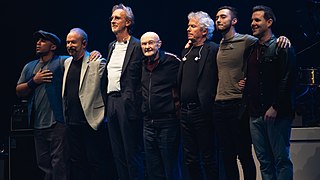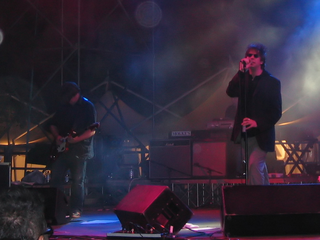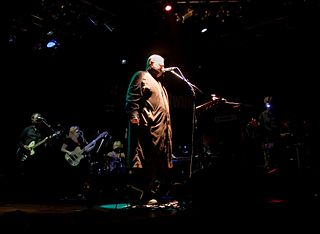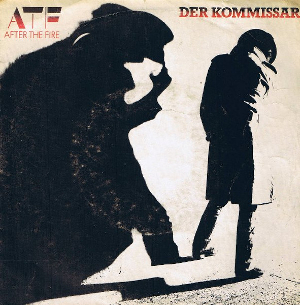
New Order are an English rock band formed in Salford in 1980 by vocalist and guitarist Bernard Sumner, bassist Peter Hook, and drummer Stephen Morris. Their integration of post-punk with electronic and dance music made them one of the most acclaimed and influential bands of the 1980s. The members regrouped after the disbandment of their previous band Joy Division due to the suicide of lead singer Ian Curtis. They were joined by keyboardist Gillian Gilbert later that year. They were the flagship band for Manchester-based independent record label Factory Records and its nightclub The Haçienda, and they worked in long-term collaboration with graphic designer Peter Saville.

Genesis were an English rock band formed at Charterhouse School, Godalming, Surrey, in 1967. The band's longest-existing and most commercially successful line-up consisted of keyboardist Tony Banks, bassist/guitarist Mike Rutherford and drummer/singer Phil Collins. In the 1970s, during which the band also included singer Peter Gabriel and guitarist Steve Hackett, Genesis were among the pioneers of progressive rock.

Echo & the Bunnymen are an English rock band formed in Liverpool in 1978. The original line-up consisted of vocalist Ian McCulloch, guitarist Will Sergeant and bassist Les Pattinson. By 1980, Pete de Freitas joined as the band's drummer.

Tears for Fears are an English pop rock band formed in Bath in 1981 by Curt Smith and Roland Orzabal. Founded after the dissolution of their first band, the mod-influenced Graduate, Tears for Fears were associated with the synth-pop bands of the 1980s, and attained international chart success as part of the Second British Invasion.

Ultravox were a British new wave band, formed in London in April 1974 as Tiger Lily. Between 1980 and 1986, they scored seven Top Ten albums and seventeen Top 40 singles in the UK, the most successful of which was their 1981 hit "Vienna".

Patricia Mae Giraldo is an American singer and songwriter. In the United States, she has two multi-platinum albums, five platinum albums, and 15 US Billboard top 40 singles, while in Canada she had eight straight platinum albums, and she has sold over 36 million albums worldwide. She is also a four-time Grammy Award winner. She was inducted into the Rock and Roll Hall of Fame in November 2022.

Killing Joke are an English rock band formed in Cheltenham, Gloucestershire, in 1979 by Jaz Coleman, Paul Ferguson (drums), Geordie Walker (guitar) and Youth (bass).

Pere Ubu is an American rock group formed in Cleveland, Ohio, in 1975. The band had a variety of long-term and recurring band members, with singer David Thomas being the only member staying throughout the band's lifetime. They released their debut album The Modern Dance in 1978 and followed with several more LPs before disbanding in 1982. Thomas reformed the group in 1987, continuing to record and tour.

Doves are an English indie rock band, formed in Manchester in 1998. The band is composed of twin brothers Jez and Andy Williams, and Jimi Goodwin. Additionally, the band employs Martin Rebelski, as a touring and session musician on keyboards. The band released five studio albums between 2000 and 2020, three of which reached #1 on the UK album charts. A compilation album, The Places Between: The Best of Doves, was released in April 2010.

Wang Chung is an English new wave band, formed in London in 1980 by Nick Feldman, Jack Hues and Darren Costin. The name Wang Chung is Chinese, meaning "yellow bell" in English, and is the first note in the Chinese classical music scale. The band found their greatest success in the US, with five top 40 hits there, all charting between 1983 and 1987, including "Dance Hall Days", "Everybody Have Fun Tonight" and "Let's Go!".
After the Fire were a British rock band that evolved from playing progressive rock to new wave over ten years, while having one hit in the United States and another hit in the United Kingdom.

The discography of the British punk rock band the Clash consists of six studio albums, two extended plays, two live albums and 31 singles.

"Fire" is a song by Irish rock band U2. It is the fifth track on the band's 1981 album, October, and it was released in July 1981 as the album's first single.

Signs of Change is a progressive rock album by After the Fire. Released 1978, after attempting to get a record contract, the band got this made themselves at a time when this was all but unheard of. What was more of interest as that it sold out its initial 2000 copy run within two weeks with little or no media publicity. The band went on to change musical direction, leaving behind most of the progressive stylistic markers and redefining themselves as new wave. With a contract from Epic they went on to more success throughout the 1980s.

Der Kommissar – The CBS Recordings is a pop rock, power pop and new wave music compilation album by British rock band After the Fire released in 2005. It is essentially a reissue of the band's three album output for CBS. The collection also benefits from bonus tracks associated with each of the original album recordings.

Deborah Ann Harry is an American singer, songwriter and actress, best known as the lead vocalist of the band Blondie. Four of her songs with the band reached No. 1 on the US charts between 1979 and 1981.

The Prodigy are an English electronic dance music band formed in Braintree, Essex, in 1990 by producer, keyboardist, and songwriter Liam Howlett. The original line-up also featured dancer and vocalist Keith Flint, dancer and live keyboardist Leeroy Thornhill, dancer Sharky, and MC and vocalist Maxim. They are pioneers of the breakbeat-influenced genre big beat, and describe their style as electronic punk.

Der Kommissar is a compilation album released by the band After the Fire in 1982, featuring the new title track, an English-language cover of a minor Falco hit from earlier that year. With the exception of "Der Kommissar", the singles featured on this compilation were originally from After the Fire's three studio albums recorded for the CBS label: Laser Love, 80-F, and Batteries Not Included. In the US, the album was released simply as ATF by Epic Records on LP and audio cassette with a different track list. It had been released in 2001 on CD by Collectables Records again with a different track list. The U.K. and European CD release follows the original track list. "Der Kommissar" became the band's biggest stateside hit, cracking the top 10.

Laser Love is the second album by UK band After the Fire. Released in 1979, the album showcased more of a new wave approach, including much shorter songs than had been featured on the band's more progressive rock-oriented debut album, Signs of Change. It was produced primarily by Muff Winwood.

"Apache" is a song written by Jerry Lordan and first recorded by Bert Weedon. Lordan played the song on ukulele to the Shadows while on tour and, liking the song, the group released their own version which topped the UK Singles Chart for five weeks in mid-1960. The Shadows' guitarist Hank Marvin developed the song's distinctive echo and vibrato sound. After hearing the Shadows' version, Danish guitarist Jørgen Ingmann released a cover of the song in November 1960 which peaked at number 2 on the Billboard Hot 100 in the US.



















